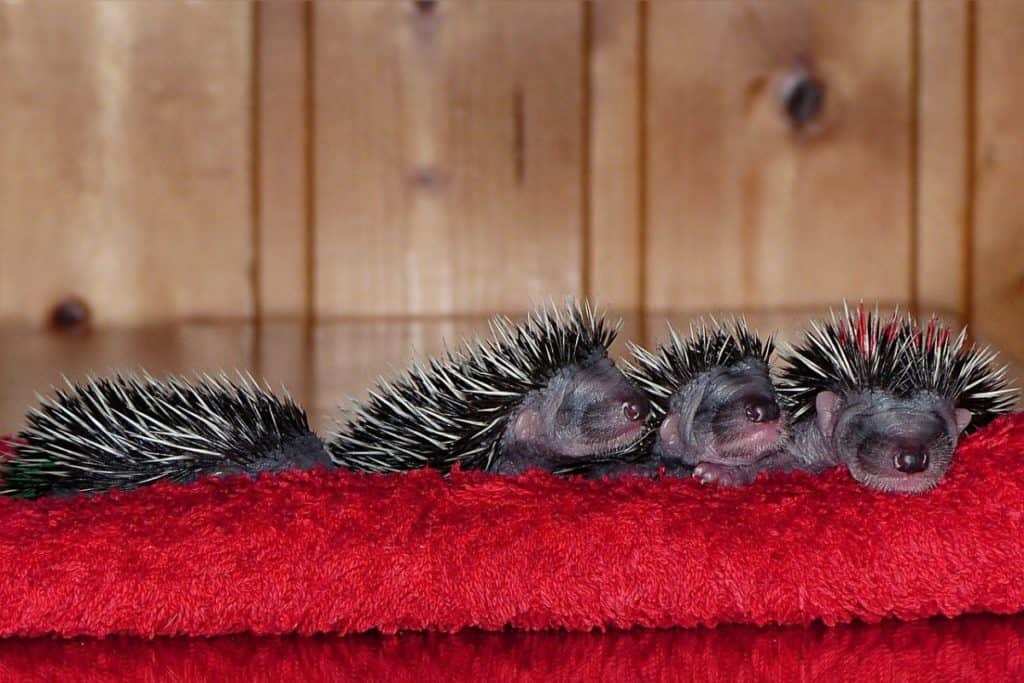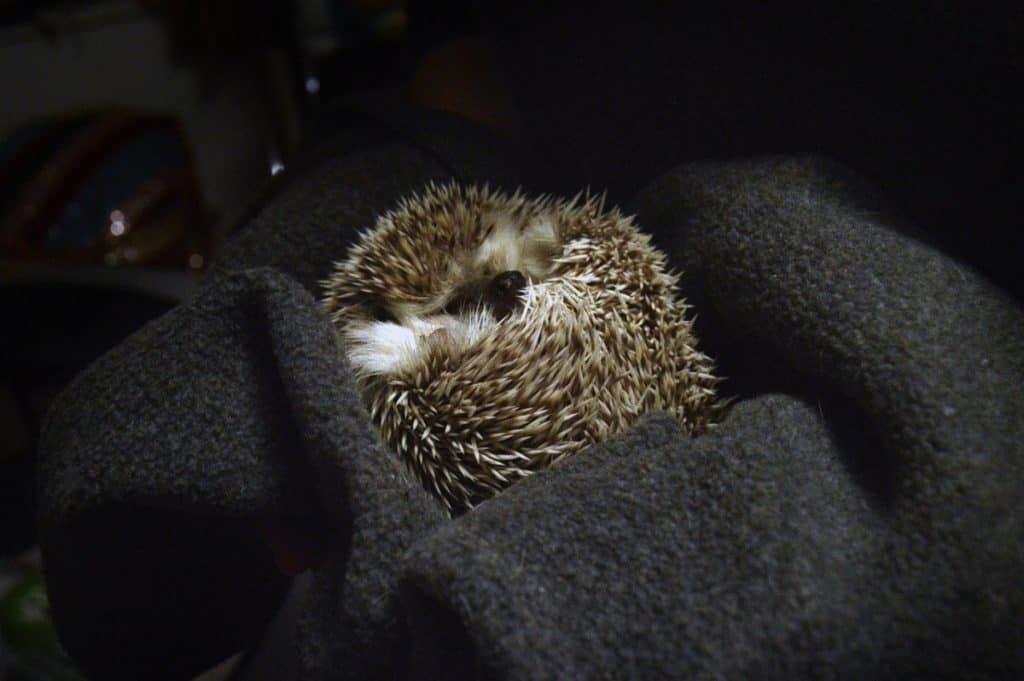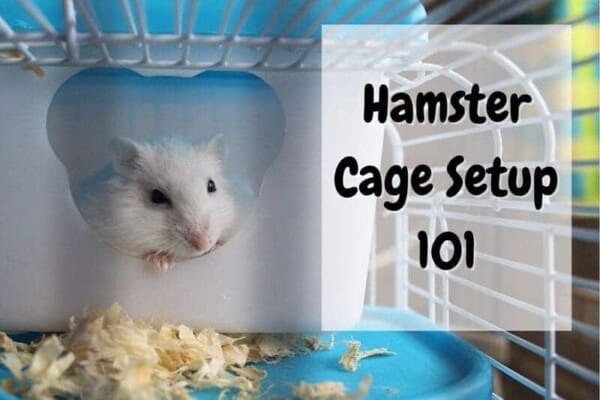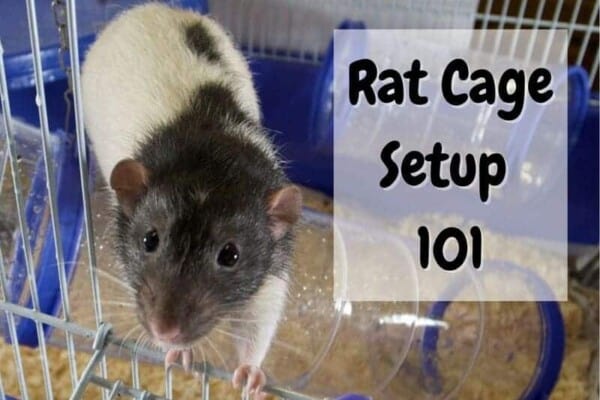Hedgehogs are exclusively nocturnal since they wake up and search for food at night. There are occasions when they will wake up in the day for a little while but quickly go back to sleep. The reason they might awake is that they were disturbed by a loud noise or something near their cage. Hedgehogs that are raised in captivity as pets can have fluctuating sleep patterns, but instinctively they are always going to be nocturnal by nature.
What is a normal Hedgehog sleep pattern?
Sleeping a lot is part of a natural hedgehog behavior and their normal sleep schedule will include nothing short of 16-18 hours a day sleeping. So what you can expect from a hedgehog that you own as a pet is for them to sleep during the whole day.
The weather patterns are also going to limit their sleeping times like in the summer when it can be reduced to between 8 and 14 hours on certain days. In the winter as the weather is cooler, they will react to these weather changes based on the warmth of the room.
Practical steps for your hedgehog to get enough sleep
- Exercise: What you can do to make a hedgehog tired and sleep better is play with them. You can also keep them busy on an exercise wheel since they like to run. It should be a running wheel that is not making much noise and is easy to clean.
- Diet: A good mixture of veggies, dry pellets, and fruits is good for them. Diet is essential just to keep them healthy, but high-sugar fruits will not be good for them since it keeps them awake. When they are tired after eating, playing, and exploring their cage they will find a place to settle in and go to sleep.
Where should I place the cage so that the hedgehog sleeps well?
Since they are asleep during the day, it will be better if you are not in the same room with them all day. Even though you don’t make a lot of noise, playing music or watching TV can be a distraction for them. Just for your peace of mind, you need to put your hedgehog cage inside a quiet room.
Most people that have a hedgehog will keep them in a room that is nowhere near their bedroom. They are nocturnal and will make noise all night and will probably rub against the edge of the cage scraping their quills. Just make sure their cage is not near the window since the temperature may fluctuate much more than the rest of the room.
Should I cover the hedgehog cage?
Yes, your hedgehog cage can be covered at times when the weather is getting colder. As long as the fabric that you cover their cage is away from the sides and they can’t reach it, it will be OK. You don’t want your hedgehog to grab the fabric as it could be a choking hazard. The safest kind is going to be fleece since it won’t contain threads.
Since hedgehogs are light-sensitive, it is always good to keep a small area uncovered so that they can sense whether it is daytime or nighttime. Good airflow inside the cage is also important so that your hedgehog does not suffocate. But for the most part, the rest of the year doesn’t need the cage to be covered at all.
Baby hedgehogs’ sleep explained

Little hedgehogs can take up to 5-6 months to become fully grown. In the first couple of months that you own a young hedgehog, they can sleep up to 20 hours a day. This is normal for them since they need sleep to develop.
They also need plenty of quiet while they sleep, so keeping them in a room where noise is low is important to not wake them up. This can be annoying if you want to play with your little hedgehogs since their waking hours are reduced to just 4 hours at night. But as they grow older, their sleeping time will steadily reduce as they mature.
Where do hedgehogs normally sleep?
There doesn’t seem to be an exact preference for hedgehogs where they want to sleep as long as it’s comfortable. It can be inside a hut, a wooden house, a cardboard box, or a fleece hidey house. Make sure you include cozy hiding places in your cage setup.
They might also be content making a nest from their bedding. Even if they have a hidey house, there’s no guarantee they’ll use it for sleeping. Chances are you’ll end up cleaning a fleece hidey house because they used it as a toilet instead of a sleeping spot.
Do hedgehogs prefer to sleep in the dark?
In the wild, a hedgehog will often just find any decent spot and fall asleep. They usually ball up so they’re protected from predators. They won’t be bothered by light since they are facing downwards away from the sun. If they find a protected spot under an old log or build a nest, this is more for making soft bedding rather than being sheltered from sunlight.
So it really doesn’t matter if the light is on or off if you have a hedgehog as a pet. If you keep them in a separate room, you can choose to turn the light off to save energy.
Hedgehog sleep issues
Hedgehogs do dream and will snore, snort, and make all sorts of noises while they sleep like little squeaks from time to time. They also can twitch and stretch to find a better position to sleep in.
They don’t grind their teeth but can act as if they’re eating if they dream about food. When you check on them while they are in a deep sleep, they can react by twitching if you touch them lightly. You have to be careful if you do this since they can twitch back poking you in the process.
When approaching your hedgehog cage, you’ll need to use soft steps and a low voice. If they are still waking up they will react better if they aren’t spooked by a sudden presence and loud noises. Talking to them with a caring voice makes a big difference as you handle a waking hedgehog.
Should I let my pet hedgehog hibernate?

If the conditions are too cold for a hedgehog, they will begin a process that causes them to hibernate due to built-in mechanisms. The biggest problem is that your pet hedgehog isn’t properly prepared to make hibernation and can easily die from starvation.
It takes nearly three months for a hedgehog in the wild to fatten up by eating anything it can. This helps them survive the coldest months when they hibernate and they will lose one-third of their body mass during this time. You can’t do this with your pet hedgie since they only eat from day to day and would starve to death in a short time if they started to hibernate.
So in a nutshell, you should never allow a pet hedgehog to attempt to hibernate under any circumstances. They will end up in critical condition or even worse if they are allowed to go into a deep sleep. Pet hedgehogs are not meant to hibernate and for all of the pygmy breeds, this will mean certain death.
There aren’t too many homes that don’t have climate control, but many regional states do experience colder climates. If you live in an area that is colder due to elevation or northern locations, your home can get colder. This means you need to regulate the temperature in your home so it doesn’t drop below 65 degrees Fahrenheit.
How to stop a hibernation attempt
There are certain steps that you can take to keep a hedgehog from hibernating if you see they are showing specific signs. The first sign is they are sluggish and wobbly when they are awake and walking around. When they actually start their hibernation they will be balled up inside a nest they’ve built.
If you try to wake them, they will resist and merely twitch as you press down lightly on their quills. What you should do at this point is raise the temperature in the room. Additionally, you can put a warming pad under their cage and bring the habitat temperature up to a comfortable level.
It shouldn’t be hot, so the heat should be gradual and over several hours. This is how you can get a hedgehog to wake up naturally. This is also a safe way that doesn’t harm them in the reanimation process.
How to prevent a hibernation attempt in the future
Pay attention to keeping the temperature in their habitat at a continual level all year long. This won’t be a problem if you live in warmer climates. But for owners who live in colder regions, this will be a yearly task to keep their cage temperature constant.
If you turn up the heat in the room or add a space heater somewhere in the room, you can prevent them from feeling the cold of winter. If you have to cover their cage at night, this can retain some habitat warmth.
Why is my hedgehog sleeping all the time?
If your hedgehog is sleeping more often than it should it can be for a couple of reasons. The first reason is that you have a young hedgehog that sleeps up to 20 hours a day. The second reason is that a grown hedgehog is too cold in its habitat so it will sleep longer as a result. This could lead to your hedgehog trying to hibernate which can be dangerous for them since pet hedgehogs are not physically prepared to handle a long period of hibernation.
If it’s an illness issue, they will be acting lethargic when they are awake and need to go to the vet right away.
Can you change a hedgehog’s sleep pattern?
This is a challenge for owners who gradually change the times they feed their hedgehogs. This has to encourage them to wake them up at times that they aren’t used to. It’s possible to roll back as many as 4 to 5 hours if you are lucky but their instinct to be nocturnal will always kick in.
You might be able to get them to wake up for a couple of hours in the day to eat, but ultimately they’ll go back to sleep until it gets dark. You don’t want to do this too often since they’ll be cranky and prone to being pokey or bitey. If you try changing their wake-up time, it must be done using half-hour increments each day.
What are some good hedgehog sleep accessories?
You don’t need many accessories for a hedgehog cage if they have decent bedding material. Naturally, they like to make a nest out of anything they can find in their habitat that appeals to them. If you spend money on accessories, you might find that a hedgehog may actually sleep wherever they want.
Related articles:
- The cost of owning a hedgehog – a complete cost breakdown
- How to pick up and hold a Hedgehog the Right Way
References and further reading:
- Preliminary note on the sleep and waking cycle in the desert hedgehog (Paraechinus hypomelas), Tauber, Edward S. Michel, Francois Roffwarg, Howard P.
- THE BEHAVIOUR OF THE HEDGEHOG (ERINACEUS EUROPAEUS L.) IN THE ROUTINE OF LIFE IN CAPTIVITY, E. J. DIMELOW
Contents
- What is a normal Hedgehog sleep pattern?
- Practical steps for your hedgehog to get enough sleep
- Baby hedgehogs’ sleep explained
- Where do hedgehogs normally sleep?
- Hedgehog sleep issues
- Should I let my pet hedgehog hibernate?
- Why is my hedgehog sleeping all the time?
- Can you change a hedgehog’s sleep pattern?
- What are some good hedgehog sleep accessories?













